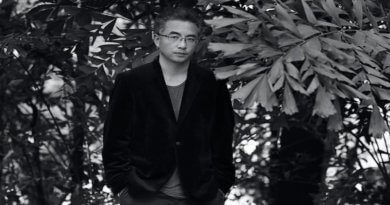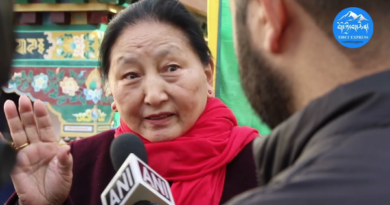Q & A: Chan Koonchung on Tibet, Sex and Censorship
By Joyce Lau, The New York Times | May 25, 2014
The shopkeeper at the small Hong Kong bookstore recognized the author Chan Koonchung right away. The People’s Recreation Community — its initials are a play on People’s Republic of China — specializes in books that are banned on the Chinese mainland, but not in the relatively free territory of Hong Kong. Mr. Chan found his own volumes on the shelf across from the cashier, while the shopkeeper brought over mugs of milk tea.

Mr. Chan, 61, a Shanghai native who grew up in Hong Kong and now lives in Beijing, caught international attention with “The Fat Years,” his 2009 sci-fi novel in which a month disappears from the historical record — but citizens never notice because they have been brainwashed into being blindly happy. Predictably, given the book’s not-so-subtle allusion to the cover-up of the 1989 Tiananmen Square crackdown, it has never been published on the mainland.
His latest novel, “The Unbearable Dreamworld of Champa the Driver,” about a young Tibetan trying to find his way in Beijing, was published in English this month. In an interview, Mr. Chan talked about sex, censorship, Tibet, stolen pets and people opening his mail. Excerpts follow:
Q. Did you try getting “The Fat Years” published on the mainland?
A. Several mainland publishers came to me after the novel got published. I asked them to read it first before we talked. They didn’t come back.
But someone — I don’t know who — typed it up in simplified Chinese and passed it around the Internet, where it stayed for about six months. There were at least two versions — one typed and one scanned — that were widely circulated, mostly as PDFs, until they were deleted. The censors were not so fast back then.
Q. Did a similar thing happen to “Champa”?
A. This time, the controls are tighter. They are getting better at blocking things. And maybe readers are less keen. There are so many titles in China now. Why would people want to spend their energy looking for the censored ones?
Q. Where do you get your own reading materials?
A. There are one or two really good bookstores in Beijing, plus Amazon China. For English books, I can go to the U.S. Amazon.com and they get through most of the time.
But banned books are a problem. I tried to get my own books — meaning books I had written — sent to me, and they were not allowed in. They are opening my boxes.
Q. What are you reading?
A. I’m trying to finish these thick novels by Jonathan Franzen — “The Corrections” and “Freedom.” I’ve also read “2666” by Roberto Bolaño. I’m not courageous enough to write such thick novels for Chinese audiences. And I read “White Teeth” by Zadie Smith. I liked that.
Q. “Champa” begins with an affair between a handsome young Tibetan and an older, richer businesswoman. She is the sugar mommy and he is the arm candy. Why did you turn this gender stereotype on its head?
A. This is something I noticed in real life. Many Chinese women in middle age, when they go to Tibet their behavior changes. They become very flirty with their tour guide or driver — and they’d never do that in Beijing. And these guys are quite handsome.
The protagonist is a Tibetan young man. He is intelligent, but not highly literate. He likes his women, his wine and his cars. I tried to write it as directly as possible. He isn’t deep. He’s deeply flawed.
Q. How does the Tibet you depict differ from the usual stereotypes?
A. My ambition was to write an antiromantic novel about Tibet. I didn’t want to write about this Shangri-La-type place that was spiritual and exotic.
I’ve been to Tibet many times. Lhasa is very modern. Half the population is not Tibetan, and many Tibetans work for the state — for example, as police. These young people behave just like other Chinese, with their fake designer jeans and obsession with cars. These guys — they do love their vehicles. So I wanted someone who was not a herder or a farmer.
Q. How much has Tibet changed in one generation?
A. I started researching Tibet because I was supposed to be producing a movie for Francis Ford Coppola’s studio. I started visiting Tibet in 1992, and it has changed a lot. There are more Chinese than ever from the mainland. The number of Chinese tourists has broken all records, but there are fewer international tourists because it is hard for them to get visas. Sometimes they will let elderly Westerners in in small groups, but the young backpackers are largely gone. The same with foreign NGOs. There are very few left in Tibet.
Q. There are two graphic scenes in which Champa seems to force himself on women, including both this businesswoman and her daughter. Would you call this rape?
A. In one case, you have a young girl who is quite unsure of her sexuality, and a young man who did not enjoy doing it. It is really a gray area. While both women did not like it, they did not resist much, either.
I wanted to create sexual relationships that were as complex as possible. It’s a metaphor for Chinese and Tibetan relationships. Tibet and China are engaged in a very complex co-dependency. You should feel uncomfortable reading these passages.
Q. With his Tibetan looks and Tibetan papers, Champa has a hard time finding a place to stay. Would you say that the Chinese were being racist to him?
A. They’re pragmatic. The hotels want to avoid trouble, and so they overreact. Landlords, too. And the result is not so subtle.
Q. The only job Champa can get in Beijing is “security work in a hotel,” which is a euphemism for “thug in a black jail” — an extralegal detention center. How common is this practice?
A. The one thing a Tibetan guy can do in Beijing is be a security guard. In fact, Beijing has held recruiting campaigns for young Lhasa men to do this work in the capital. So Champa goes to work for one of these “hotels.”
When the government rounds up petitioners, they are kept in these “hotels” until they can be sent back to their home provinces. There are also “hotels” that the local security officials use for people when they don’t want to press official charges. It’s a non-place.
- Champa gets involved with activists trying to save a truckload of dogs headed for the slaughterhouse. Does this really happen?
A. Eating dog is legal in China, and the dog meat restaurants need supplies. But nobody actually rears meat dogs — it’s too expensive — so they just steal them.
These incidents really take place. A group of activists will stop a delivery truck with their cars — they have cars because they are generally middle-class. Then they buy up the stock of stolen dogs. I find it encouraging that people are organizing things not related to their immediate interests.
Q. You’ve worked with Greenpeace and local environmental groups. You also predict a dark ecological future in your novels. How bad is the situation in China? Is the damage reversible?
A. Some rivers could still be cleaned up — some, maybe not all. The air quality could be improved if they made an effort to phase out coal. Forestry is almost gone. That’s too late. You can’t replant biodiversity. But the main problem is the underground water — it’s so polluted. This is the most serious crisis: the water supply.



